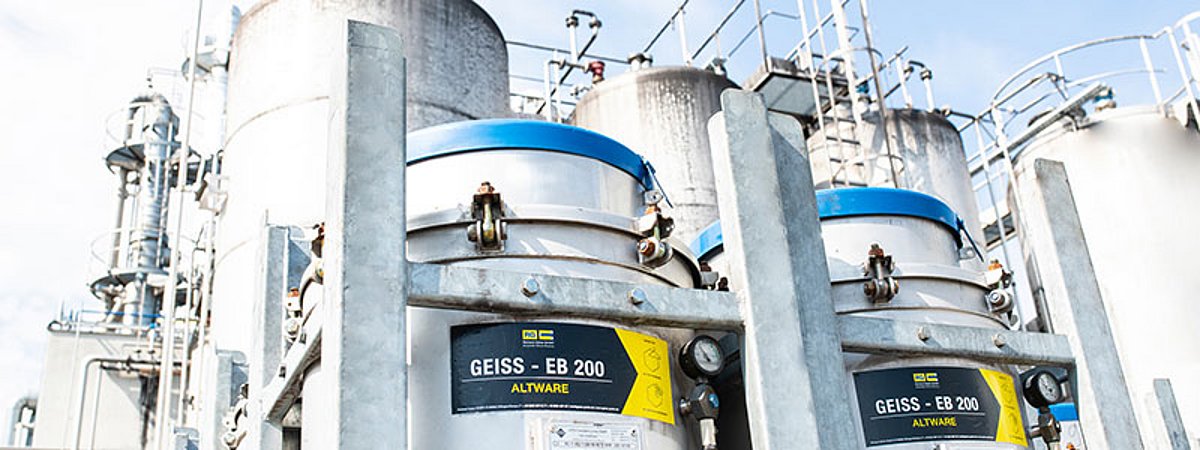Richard Geiss saves over 30,000 tons of CO2 with recyclates

Richard Geiss and his customers have saved over 30,000 tons of CO2 with recycled materials, because the use of recycled solvents saves a lot of CO2. Geiss uses special CO2 certificates to prove exactly how much.
The solvent specialist Richard Geiss GmbH is the first manufacturer ever to individually determine the so-called product carbon footprint for each customer and each recyclate and compare this with newly produced goods. Richard Geiss is thus taking on a pioneering role in Europe. In 2023 alone, customers saved a total of 31,126 tons of CO2 through the use of recyclates compared to virgin material. "This is a huge impact and shows how important issues such as environmental protection and sustainability are to our customers. With our CO2 certificates, we can now document this commitment in black and white. This is a really great way of making our customers' environmentally conscious purchasing decisions measurable and visible. In this way, we want to create more awareness for the sustainable use of solvents and for recyclates as low-CO2 alternatives to virgin materials," explains Bastian Geiss, Managing Partner of Richard Geiss GmbH.
Over 30,000 tons of CO2 saved
So far, Richard Geiss has the figures for 2023, but the company is also expecting high CO2 savings for last year. This is because in 2024, its customers again saved a lot of CO2 by using recycled materials compared to fresh goods. This change in thinking, away from virgin material and towards solvent recyclates, is already in full swing: together with its customers, Richard Geiss GmbH achieved a total CO2 saving of 31,126 tons in 2023 alone. Every company that purchases recyclates from the Bavarian solvent specialist has a share in this saving and can receive an individual CO2 certificate on request. The CO2 savings values can also be found on every invoice that customers receive for an order of Richard Geiss recyclates. The CO2 certificates can be an important document for audits, for example for environmental management (ISO 14001), as they make the CO2 savings through the use of recyclates measurable and therefore also verifiable. Compared to virgin materials, recycled solvents conserve resources and reduce waste and CO2 emissions. For the CO2 certificates, Richard Geiss GmbH calculates how much CO2 the customer actually saves with which recycled material compared to virgin material. The values are determined on the basis of the central ecoinvent database. As a comprehensive eco-inventory database, it provides transparent information on the environmental impact of various services and products, such as solvents. "Our certificates also show that every company can save CO2 by using recycled solvents instead of virgin materials," emphasizes Peer Linse, Commercial Director of the company. For example, a single Geiss customer saved over 830 tons of CO2 in 2023 by purchasing the recyclate NMP, which is an impressive 84% compared to virgin material. The company had purchased around 160 tons of recycled N-methyl-2-pyrrolidone (NMP).
Recyclate expertise from Richard Geiss
Richard Geiss GmbH has been operating a circular economy for decades and is one of Europe's leading experts in solvent recycling. "It has always been clear that our recyclates not only save raw materials, but also CO2. With the CO2 certificates, we can now demonstrate these savings in concrete terms - and so can our customers. This is extremely important for them, because now they can prove in black and white how serious they are about achieving sustainability goals," says Bastian Geiss. The solvent specialist offers CO2 certificates for recyclates in various business areas - whether for surface and textile cleaning or for the chemical and pharmaceutical industries. The solvent specialist has already calculated the relative CO2 savings for a total of 29 recyclates and issued CO2 certificates. In the case of the recyclate perchloroethylene (PER), for example, which is used in surface and textile cleaning, the relative CO2 saving is 73 percent or 3.02 tons CO2-eq.
